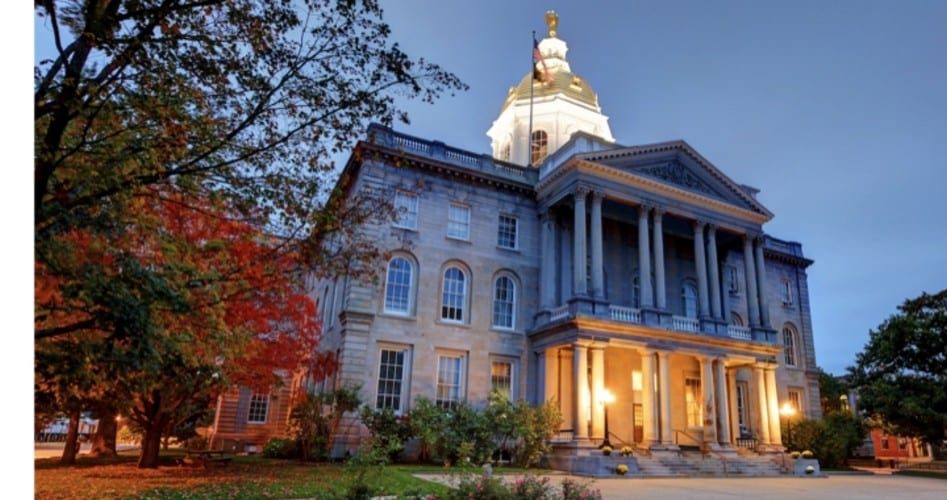
Citing “great danger in, a new constitution or in opening the United States Constitution to sweeping changes,” a bill has been pre-filed in the New Hampshire state legislature that would immediately rescind all of the state’s prior calls for a constitutional convention as described in Article V of the U.S. Constitution.
House Concurrent Resolution 9 (HCR9), currently supported by 10 members of the state’s House of Representatives, is short and sweet and sticks a dagger into the heart of the con-con movement in the Granite State.
Recognizing that the state legislature, “acting with the best intentions,” has “previously made applications to the United States Congress to call one or more conventions to propose amendments concerning specific subjects to the United States Constitution, pursuant to Article V,” the newly introduced resolution would render all the old attempts “rescinded and deemed null and void.”
A similar resolution introduced last year in New Hampshire was stillborn and never made it out of committee.
That hasn’t stopped supporters of the rescission from running back up the hill. Here are the reasons they want New Hampshire off of the con-con train.
First, the bill cites several constitutional scholars in defense of its claim that an Article V convention would pose an “imminent peril to the well established rights of citizens and the duties of various levels of government.”
They’re right.
Calling a constitutional convention would be very risky. It is risky because the changes could end up being as radical as altering the fundamental structure of our government — and could even entail an entirely new Constitution.
The success of such a convention in adding any helpful amendments would not only be dicey, but it would be gambling with the Constitution. This is true not only because of the nature of conventions — which may go off in unpredictable directions when called — but also because not everyone who supports a constitutional convention supports the same goals. Make no mistake: There would be plenty of wolves howling outside the doors of a constitutional convention, and, more importantly, there would be packs of them inside the convention, as well.
The prospect of a convention this powerful, composed of politicians (many of whom would likely be bought and paid for by powerful lobbyists and special interest groups) determined to tinker with the precision gears that give movement to the works of our mighty Republic, is frightening and should be enough to give pause to everyone considering enlisting in the forces fighting for a con-con.
Next, the bill claims that should any such convention be called, the resolution predicts it would “create legal chaos in this nation and only begin the process of another 2 centuries of litigation over its meaning and interpretation.”
Determined citizens and state legislators can already prevent problems caused by abuse of the present Constitution simply by refusing to elect people who plan to break the law — politicians usually state that they are going to do so, though not in so many words.
One reliable remedy is education.
Thomas Jefferson wrote: “If a nation expects to be ignorant and free … it expects what never was and never will be.” A fundamental requirement of vigilance is holding elected representatives’ feet to the fire by compelling them to honor their oath of office and not exceed the limits of their power as set forth in the Constitution.
Even the most conservative estimates indicate that about 80 percent of expenditures approved by Congress violate the U.S. Constitution. That fact wouldn’t change by adding an amendment to the Constitution.
Whether these bills spend our national treasure on unconstitutional and undeclared foreign wars, billions sent overseas in the form of foreign aid, expanding the so-called entitlement programs, or redistributing wealth via corporate and individual welfare schemes, none of these outlays is authorized by the Constitution.
The New Hampshire lawmakers calling for the rescission of their state’s previous calls for an Article V convention believe that the best way to stop the federal government’s constant disregard of constitutional limits on its power is for states to enforce the limits already placed in the provisions of the U.S. Constitution.
They realize that the federal government will treat any new amendment restricting its authority the same way they treat those already in the Constitution.
Considering the penchant of all three branches of the federal government — congressional, executive, and judicial — to routinely disregard existing constitutional restraints on their power, why should we expect that they would suddenly faithfully obey an amended Constitution?
In fact, why would we even assume that an amended Constitution would be an improvement?
The Constitution has been amended 27 times in the past, but not all of those amendments improved the Constitution, despite claims made by proponents at the time. For instance, in 1913 two damaging amendments were added to the Constitution: the 16th Amendment authorizing the federal government to impose an income tax and the aforementioned 17th Amendment. Those amendments — and all others to date — were proposed by Congress and ratified by the states.
Would a constitutional convention propose beneficial or harmful changes to the Constitution? And if the latter proves to be the case, would the states — caught up in the political passions of the moment — still ratify these changes as they did the 16th and 17th Amendments? There is no way of knowing for sure.
And this is the risk that is understood and will be avoided should HCR 9 be enacted by the state of New Hampshire.
All states who’ve previously called for a con-con should follow New Hampshire’s example and reconsider their support for a proposition as dangerous as a constitutional convention.
Photo of the New Hampshire State House: DenisTangneyJr / iStock / Getty Images Plus



